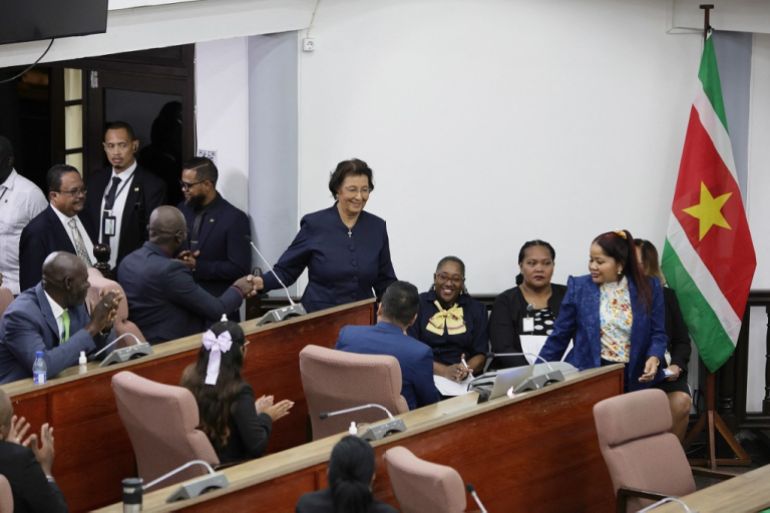Suriname elects first female president amid economic uncertainty | Politics News
Jennifer Geerlings-Simons to lead the impoverished Latin American country through crisis before oil wealth arrives.
Suriname has elected Jennifer Geerlings-Simons as its first female president, with parliament backing the 71-year-old physician and lawmaker to lead the crisis-hit South American nation.
Her election came after a coalition deal was struck in the National Assembly, which voted by a two-thirds majority on Sunday.
The move followed inconclusive May polls and mounting pressure to replace outgoing President Chandrikapersad Santokhi, whose tenure was marred by corruption scandals and harsh austerity.
Geerlings-Simons, leader of the National Democratic Party, ran unopposed and will take office on July 16.
“I am aware that the heavy task I have taken on is further aggravated by the fact that I am the first woman to serve the country in this position,” she said after her confirmation.
She will be joined by running mate Gregory Rusland, as the pair inherit a country struggling under the weight of economic hardship, reduced subsidies, and widespread frustration. While Santokhi’s government managed to restructure debt and restore macroeconomic stability with IMF backing, it also triggered mass protests over deep cuts.
![Suriname's opposition leader Jennifer Geerlings-Simons (C) greets parliamentarians after the National Assembly election in Paramaribo on July 6, 2025. [Ranu Abhelakh/ AFP]](https://www.occasionaldigest.com/wp-content/uploads/2025/07/000_64XZ9NQ-1751868905.jpg)
With Suriname expected to begin producing offshore oil in 2028, Geerlings-Simons has promised to focus on stabilising state finances. She has previously pledged to boost revenues by tightening tax collection, including from small-scale gold miners.
Economists warn she faces a rocky road ahead. Winston Ramautarsingh, former head of the national economists’ association, said Suriname must repay about $400m annually in debt servicing.
“Suriname does not have that money,” he said. “The previous government rescheduled the debts, but that was only a postponement.”
Geerlings-Simons will now be tasked with steering the Dutch-speaking country of 646,000 people through a fragile period, balancing public discontent with the promise of future oil wealth.
As Suriname prepares to mark 50 years since gaining independence from the Netherlands this November, the small South American country is pinning its hopes on a new era driven by oil wealth and deepening ties with China.
In 2019, it joined China’s Belt and Road Initiative, becoming one of the first Latin American states to sign on to the vast infrastructure project.
Suriname is one of the continent’s poorest nations, despite its rich ethnic tapestry that includes descendants of Africans, Indigenous groups, Indians, Indonesians, Chinese, and Dutch settlers.
